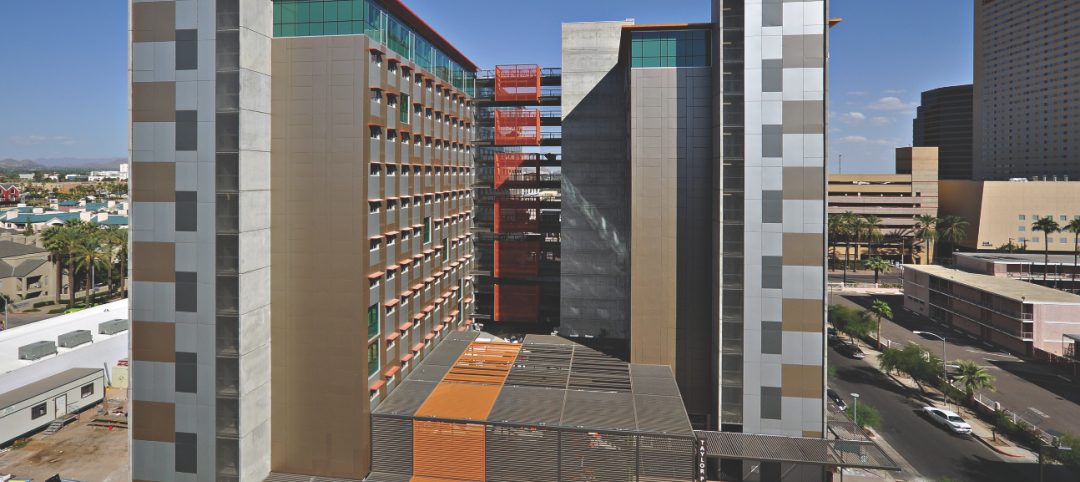New York may be home to more architectural landmarks than any city in the U.S., so when renowned architect Bjarke Ingels was commissioned by Durst Fetner to design a new apartment building along the city’s Hudson River, he chose to make a splash.
The result is VIA 57 West, an audacious, shape-shifting structure that appears as a soaring 467-foot spire when seen from the city-side of the building and a glittering metal-clad pyramid when viewed from the river.
Featuring a hybrid design that unites the traditional looks of a courtyard-block-style apartment complex and a towering Manhattan high-rise, VIA 57 West creates a striking profile on the New York city skyline and satisfies Ingels’ desire to connect residents to the outside world. To achieve that objective, the architect incorporated a variety of components, including a generous courtyard that punctures the center of the façade, open terraces that perforate the glittering metal curtain wall and oversized bay windows strategically positioned to brighten each of the building’s 709 apartments.
Utilizing Solarban® 70XL glass by Vitro Glass, the floor-to-ceiling windows in VIA 57 West contribute to an integrated energy management program that incorporates a highly efficient mechanical system, occupancy sensors for lighting and a hybrid water source heat pump system.
Carlos Amin, vice president of sales for Tecnoglass, said his company fabricated 5,000 window units from Solarban® 70XL glass in an array of shapes and sizes for the project, which he called one of the most complex he had ever worked on.
“The building faces west, so the architect was intent on specifying a product with a high solar heat gain coefficient,” he explained. “He also wanted a glass with good transparency to preserve the views.”
Formulated with the industry’s first triple-silver coating, Solarban® 70XL glass has a solar heat gain coefficient (SHGC) of 0.27 and a visible light transmittance of 64 percent in a standard 1-inch insulating glass unit. That configuration, which was specified for VIA 57 West, enables window units to block more than 70 percent of the ambient solar energy from entering the building, reducing demand for air-conditioning in the spring and summer, and enhancing the comfort and views of building occupants throughout the year.
As a glass and metal fabricator, Tecnoglass served as part of an integrated team of high-end contractors involved in meeting the building’s complex design demands. Working together, Tecnoglass, ENCLOS, Techniform and Bunting Architectural Metals fabricated, assembled and installed more than 350,000 square-feet of curtain wall; a 110,000-square-foot stainless steel slope wall; 1,200 stainless steel cladding components and 50,000 square-feet of glass-fiber reinforced concrete to create a 515,200-square-foot building envelope.
Since opening in 2016, VIA 57 West has gained numerous accolades for both its design and environmental performance. Even more important, it has added a gleaming new inhabitant to New York’s register of famous architecture while providing an oasis of comfort and sustainability to more than 700 residents and their families.
To learn more about Solarban® 70XL glass and other high-performance glass products by Vitro Glass, visit www.vitroglazings.com.
Related Stories
| Sep 13, 2010
Committed to the Core
How a forward-looking city government, a growth-minded university, a developer with vision, and a determined Building Team are breathing life into downtown Phoenix.
| Aug 11, 2010
New data shows low construction prices may soon be coming to an end
New federal data released recently shows sharp increases in the prices of key construction materials like diesel, copper and brass mill shapes likely foreshadow future increases in construction costs, the Associated General Contractors of America said. The new November producer price index (PPI) report from the Bureau of Labor Statistics provide the strongest indication yet that construction prices are heading up, the association noted.
| Aug 11, 2010
Using physical mockups to identify curtain wall design flaws
Part two of a five-part series on diagnosing and avoiding cladding, glazing, and roofing failures from building forensics expert IBA Consultants.
| Aug 11, 2010
Best AEC Firms of 2011/12
Later this year, we will launch Best AEC Firms 2012. We’re looking for firms that create truly positive workplaces for their AEC professionals and support staff. Keep an eye on this page for entry information. +
| Aug 11, 2010
AAMA leads development of BIM standard for fenestration products
The American Architectural Manufacturers Association’s newly formed BIM Task Group met during the AAMA National Fall Conference to discuss the need for an BIM standard for nonresidential fenestration products.
| Aug 11, 2010
NoricF4 custom metal ICF frames receive fire ratings, comply with antiterrorism standards for buildings
Reward Wall Systems' NoricF4 Custom Metal ICF Frames have received fire ratings of 1.5 hours to 3 hours and they have been evaluated to be in compliance with the prescriptive requirements of the Department of Defense Minimum Antiterrorism Standards for Buildings for blast/force protection.
| Aug 11, 2010
AIA Course: Enclosure strategies for better buildings
Sustainability and energy efficiency depend not only on the overall design but also on the building's enclosure system. Whether it's via better air-infiltration control, thermal insulation, and moisture control, or more advanced strategies such as active façades with automated shading and venting or novel enclosure types such as double walls, Building Teams are delivering more efficient, better performing, and healthier building enclosures.
| Aug 11, 2010
Glass Wall Systems Open Up Closed Spaces
Sectioning off large open spaces without making everything feel closed off was the challenge faced by two very different projects—one an upscale food market in Napa Valley, the other a corporate office in Southern California. Movable glass wall systems proved to be the solution in both projects.







